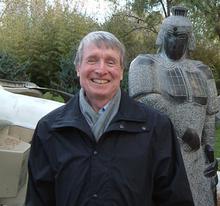“约翰·霍兰德 John H Holland”的版本间的差异
(→基本信息) |
(→生平) |
||
| 第25行: | 第25行: | ||
==生平== | ==生平== | ||
| − | |||
| − | + | 霍兰德在1929年生于美国印第安纳州的Fort Wayne。他在麻省理工学院学习物理学,并在1950年获得学士学位,然后又求学于密歇根大学,分别于1954年和1959年获得数学硕士和计算机博士学位(这是世界是第一个计算机博士学位)。<ref>{{cite web |url=http://krasnow.gmu.edu/images/DOM%20Photos/Vita%2007.doc |title=Archived copy |accessdate=March 2, 2008 |url-status=dead |archiveurl=https://web.archive.org/web/20080911075246/http://krasnow.gmu.edu/images/DOM%20Photos/Vita%2007.doc |archivedate=September 11, 2008 }}</ref>霍兰德之后担任了密歇根大学的电气工程与计算机科学教授,兼心理学教授。此外,他还是[https://www2.rowland.harvard.edu/ 罗兰德科学研究所]和[https://www.uib.no/en 卑尔根大学]的访问学者。 | |
| − | + | 霍兰德还担任[[圣塔菲研究所|圣塔菲研究所_Santa_Fe_Institute]]的董事会亦即科学指导委员会成员,同时也是世界经济论坛的成员。<ref name="SantaFe">{{cite web |url=http://www.santafe.edu/about/people/profile/John%20H.%20Holland |title=Profile: John H. Holland |publisher=[[Santa Fe Institute]] |url-status=dead |archiveurl=https://web.archive.org/web/20130202004956/http://www.santafe.edu/about/people/profile/John%20H.%20Holland |archivedate=February 2, 2013 }}</ref> | |
| − | + | 霍兰德在1961年获授富兰克林研究所的Louis E. Levy奖,还在1992年被授予麦克阿瑟天才奖。<ref name="LevyMedal_Laureates">{{cite web|url=http://www.fi.edu/winners/show_results.faw?gs=&ln=&fn=&keyword=&subject=&award=LEVY+&sy=1923&ey=1999&name=Submit |title=Franklin Laureate Database - Louis E. Levy Medal Laureates |publisher=Franklin Institute |accessdate=January 22, 2011 |url-status=dead |archiveurl=https://web.archive.org/web/20110629195033/http://www.fi.edu/winners/show_results.faw?gs=&ln=&fn=&keyword=&subject=&award=LEVY+&sy=1923&ey=1999&name=Submit |archivedate=June 29, 2011 }}</ref><ref>https://www.macfound.org/fellows/463/</ref> | |
| − | Holland | + | 2015年8月9日,霍兰德在密歇根安娜堡与世长辞。<ref>[http://www.santafe.edu/news/item/in-memoriam-john-holland/ Complexity science pioneer John Holland passes away at 86] at santafe.edu</ref> |
== 研究领域 == | == 研究领域 == | ||
2020年5月8日 (五) 20:32的版本
基本信息
| 类别 | 信息 |
|---|---|
| 出生时间 | 1929-02-02 |
| 逝世时间 | 2015-08-09 |
| 国籍: | 美国 |
| 母校: | 密歇根大学、麻省理工学院 |
| 成就: | 开创遗传算法研究 |
| 主要研究方向: | 遗传算法、复杂适应系统、心理学 |
约翰·霍兰德(1929-2015)是美国科学家,安娜堡密歇根大学的电气工程与计算机科学教授,兼心理学教授,同时他还是遗传算法的研究先驱。
生平
霍兰德在1929年生于美国印第安纳州的Fort Wayne。他在麻省理工学院学习物理学,并在1950年获得学士学位,然后又求学于密歇根大学,分别于1954年和1959年获得数学硕士和计算机博士学位(这是世界是第一个计算机博士学位)。[1]霍兰德之后担任了密歇根大学的电气工程与计算机科学教授,兼心理学教授。此外,他还是罗兰德科学研究所和卑尔根大学的访问学者。
霍兰德还担任圣塔菲研究所_Santa_Fe_Institute的董事会亦即科学指导委员会成员,同时也是世界经济论坛的成员。[2]
霍兰德在1961年获授富兰克林研究所的Louis E. Levy奖,还在1992年被授予麦克阿瑟天才奖。[3][4]
2015年8月9日,霍兰德在密歇根安娜堡与世长辞。[5]
研究领域
Holland frequently lectured around the world on his own research, and on research and open questions in complex adaptive systems (CAS) studies. In 1975 he wrote the ground-breaking book on genetic algorithms, "Adaptation in Natural and Artificial Systems". He also developed Holland's schema theorem.
博士生导师
https://en.wikipedia.org/wiki/Arthur_Walter_Burks
//可以有名字、图片、链接等等
学生
https://en.wikipedia.org/wiki/Edgar_F._Codd
https://en.wikipedia.org/wiki/Melanie_Mitchell //可以有名字、图片、链接等等
合作学者
//可以有名字、图片、链接等等
xxx(人名)与集智
//有些大佬参加过集智举办的活动或有过合作课题,都可以写上去
就职企业、机构或院校
(机构名)
//机构详细信息及该人物在机构中主要负责哪方面的研究/工作、取得过什么样的成就或发展,可以有图片等信息
主要文章及著作
- [文章链接 文章名]发表信息(发表年份/日期,被引次数)
//注意大佬们文章都很多,但是不要照搬,摘取重点影响力高的即可(如谷歌学术中被引次数多的),重点书籍可以适当展开说明,但是需要注意使用下一级标题和排版
Holland is the author of a number of books about complex adaptive systems, including:
- Adaptation in Natural and Artificial Systems (1975, MIT Press)
- Hidden Order: How Adaptation Builds Complexity (1995, Basic Books)
- Emergence: From Chaos to Order (1998, Basic Books)
- Signals and Boundaries: Building Blocks for Complex Adaptive Systems (2012, MIT Press)
- Complexity: A Very Short Introduction (2014, Oxford University Press)
Articles, a selection:
- "A universal computer capable of executing an arbitrary number of subprograms simultaneously", in: Proc. Eastern Joint Comp. Conf. (1959), pp. 108–112
- "Iterative circuit computers", in: Proc. Western Joint Comp. Conf. (1960), pp. 259–265
- "Outline for a logical theory of adaptive systems", in: JACM, Vol 9 (1962), no. 3, pp. 279–314
- "Hierarchical descriptions, universal spaces, and adaptive systems", in: Arthur W. Burks, editor. Essays on Cellular Automata (1970). University of Illinois Press
- "Using Classifier Systems to Study Adaptive Nonlinear Networks", in: Daniel L. Stein, editor. Lectures in the Sciences of Complexity (1989). Addison Wesley
- "Concerning the Emergence of Tag-Mediated Lookahead in Classifier Systems", in: Stephanie Forrest, editor. Emergent Computation: self-organizing, collective, and cooperative phenomena in natural and computing networks (1990). MIT Press
- "The Royal Road for Genetic Algorithms: Fitness Landscapes and GA Performance", in: Francisco J. Varela, Paul Bourgine, editors. Toward a Practice of Autonomous Systems: proceedings of the first European conference on Artificial Life (1992). MIT Press
- "Echoing Emergence: objectives, rough definitions, and speculations for ECHO-class models", in: George A. Cowan, David Pines, David Meltzer, editors. Complexity: metaphors, models, and reality (1994), Addison-Wesley
- "Can There Be A Unified Theory of Complex Adaptive Systems?", in: Harold J. Morowitz, Jerome L. Singer, editors. The Mind, The Brain, and Complex Adaptive Systems (1995). Addison-Wesley
- "Board Games", in: John Brockman, editor. The Greatest Inventions of the Past 2000 Years (2000). Phoenix
- "What is to Come and How to Predict It.", in: John Brockman, editor. The Next Fifty Years: science in the first half of the twenty-first century (2002). Weidenfeld & Nicolson
相关链接
视频
[视频网址 视频名称]:视频主题 //可展开说明视频的重点内容、影响、背后的故事等等。
更多信息
[网址 名称] //可以是wiki词条地址、百度百科、人物个人主页或博客主页等。
- ↑ "Archived copy". Archived from the original on September 11, 2008. Retrieved March 2, 2008.
{{cite web}}: CS1 maint: archived copy as title (link) - ↑ "Profile: John H. Holland". Santa Fe Institute. Archived from the original on February 2, 2013.
- ↑ "Franklin Laureate Database - Louis E. Levy Medal Laureates". Franklin Institute. Archived from the original on June 29, 2011. Retrieved January 22, 2011.
- ↑ https://www.macfound.org/fellows/463/
- ↑ Complexity science pioneer John Holland passes away at 86 at santafe.edu
